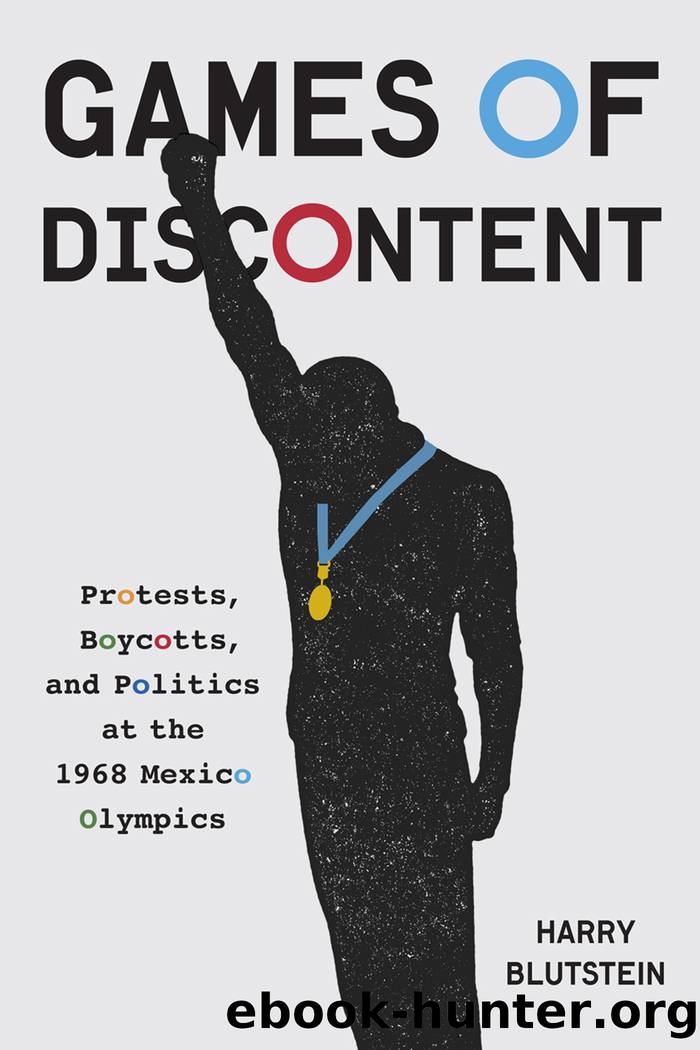Games of Discontent by Harry Blutstein

Author:Harry Blutstein
Language: eng
Format: epub
Publisher: McGill-Queen's University Press
Published: 2021-03-15T00:00:00+00:00
NO TRIAL, JUST PUNISHMENT
In Acapulco, Brundage watched the protest on the local television network Telesistema (now Televisa), which took its feed from US network ABC.
He was appalled by what he saw. The protest was inexcusable. Smith and Carlos, and to a lesser degree Peter Norman, had introduced politics into the Olympics. In addition, they had defiled one of its sacred rituals by not following its rigid protocols. The athletes were apostates, challenging Olympism, with its quasi-religious affectations. This was sufficient reason for Brundage, who saw himself as a staunch defender of the faith, to banish them from the âisle of the blessedâ.
Brundage was not a man to cross. He was first elected as IOC president in 1952, and heâd come to dominate the organisation like no one had before him. In The Official History of the Olympic Games and the IOC, David Miller wrote that âAvery Brundage was despotic, a moralistic bulldozer, fanatical defender of de Coubertinâs legacyâ.51 William Johnson of Sports Illustrated observed that he âstrode the earth as if he were a crowned monarch, and he ruled the Olympic movement as if it were a fiefdomâ.52
As much as Brundage would have liked the IOC to punish the athletes, its rules left Olympic justice in the hands of each nationâs Olympic committee. Returning to Mexico City that night, Brundage confronted members of the US Olympic Committee (USOC). He wanted the athletes severely punished.
The USOC executive held an emergency meeting. The hawks supported Brundage. They wanted Smith and Carlos suspended from the team and tossed out of Mexico for disrespecting the American flag. The doves hoped to resolve the situation peacefully and avoid provoking other US athletes to protest in sympathy. After four hours of heated debate, they decided to censure Smith and Carlos.
Brundage was furious with what he saw as a tepid reprimand. At 6 a.m. the next morning the president of the USOC, Douglas Roby, was woken and ordered to attend a 9 a.m. meeting of the IOCâS nine-member Executive Board. At the meeting Brundage issued an ultimatum. Expel Smith and Carlos from the Olympic Village and send them home or the IOC would ban the entire US track and field team.
At 9.30 p.m. Roby called together the members of the USOC to consider Brundageâs ultimatum. After almost three hours of debate they decided to eject Smith and Carlos from the Olympic Village. Their decision was more symbolic than it was a real punishment: both athletes had no more events to run and had already moved out and were staying in hotels downtown.
Did the punishment fit the crime? And what was the crime? The USOC had issued a statement charging Smith and Carlos with âimmature behaviorâ and âuntypical exhibitionism [that] ⦠violates the basic standards of good manners and sportsmanshipâ.53 What sort of offense was untypical exhibitionism? How did it differ from typical exhibitionism, which was presumably acceptable? And was immature behaviour such a heinous crime that it called for the public humiliation of Smith and Carlos?
Peter Normanâs part in the protest was not forgotten either.
Download
This site does not store any files on its server. We only index and link to content provided by other sites. Please contact the content providers to delete copyright contents if any and email us, we'll remove relevant links or contents immediately.
Nudge - Improving Decisions about Health, Wealth, and Happiness by Thaler Sunstein(6643)
iGen by Jean M. Twenge(4705)
The Fire Next Time by James Baldwin(4351)
Adulting by Kelly Williams Brown(3681)
The Sports Rules Book by Human Kinetics(3597)
The Hacking of the American Mind by Robert H. Lustig(3588)
The Ethical Slut by Janet W. Hardy(3512)
Captivate by Vanessa Van Edwards(3306)
Mummy Knew by Lisa James(3174)
In a Sunburned Country by Bill Bryson(2953)
The Worm at the Core by Sheldon Solomon(2928)
Ants Among Elephants by Sujatha Gidla(2928)
Suicide: A Study in Sociology by Emile Durkheim(2615)
The Slow Fix: Solve Problems, Work Smarter, and Live Better In a World Addicted to Speed by Carl Honore(2578)
Humans of New York by Brandon Stanton(2382)
Handbook of Forensic Sociology and Psychology by Stephen J. Morewitz & Mark L. Goldstein(2380)
Blackwell Companion to Sociology, The by Judith R. Blau(2320)
The Happy Hooker by Xaviera Hollander(2276)
Outliers by Malcolm Gladwell(2263)
